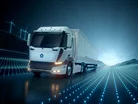IDTechEx Explores Autonomous Truck Industry Expansion

The autonomous truck industry is experiencing a remarkable resurgence, with record-breaking vehicle deliveries across Asia, Europe and the United States. Companies are rapidly advancing into the commercialisation and testing phases.
According to Shihao Fu, a Technology Analyst at IDTechEx, autonomous trucks are tackling significant real-world challenges by reducing transportation costs and optimising Total Cost of Ownership (TCO) through careful, practical calculations.
"In the report, 'Autonomous Trucks 2024-2044: Technologies, Trends, Forecasts,' IDTechEx conducts a comprehensive TCO analysis across different levels of autonomy and powertrain types, focusing on the cost structures in the United States and China," says Shihao.
The analysis compares the disparities in procurement costs, maintenance and operational expenses between these two major markets.
Insights from a decade of operations
The analysis applies various cost factors to a 10-year operational model. Shihao adds, "utilising exclusive data obtained from their research targets." IDTechEx's evaluation of maintenance and operational costs across different markets is more refined than other TCO analyses in the industry.
The report considers factors such as depreciation, highway tolls, management fees and insurance, presenting a detailed picture of the cost differences.
Through detailed TCO analysis of various autonomous truck types in both China and the US, IDTechEx identified several key factors driving cost differences, including purchase prices, maintenance expenses, fuel costs and unique market conditions.
Purchase costs: For mid-to-high-end Level 0 (non-autonomous) trucks, the purchase cost in China is approximately US$70,000, compared to US$114,286 in the US, representing a 63% difference. The disparity is attributed to significant differences in manufacturing costs, market scale and labour expenses between the two countries.
China's robust manufacturing infrastructure and large-scale production capabilities enable lower truck production costs. Additionally, China's high demand for trucks further reduces the cost per vehicle through economies of scale.
Advanced autonomous vehicles: For Level 2/Level 3 autonomous trucks, the reference purchase cost in China is US$112,000, while in the US, it is US$214,286—about 91% higher. The higher cost of developing and integrating autonomous systems in the US, coupled with stringent regulations that require higher technical maturity and safety standards, drives up the cost of these advanced models.
The cost gap becomes even more pronounced when analysing Level 4 autonomous electric trucks, with reference purchase costs of US$250,000 in China versus US$450,000 in the US.
Electric trucks and the battery factor
The upfront cost of electric trucks, particularly at Level 4 autonomy, is largely determined by battery pack size. Lithium-ion battery packs are priced between US$160 and US$200 per kWh.
A medium-duty truck with a 150 kWh battery costs over US$25,000, while a heavy-duty truck with a 400 kWh battery could see costs exceeding US$65,000.
China's booming EV market has significantly optimised battery material costs and supply chains. Coupled with government subsidies and economies of scale, China's advantage in EV production is difficult to match purely through market forces.
In contrast, while the EV market in the US is proliferating, there needs to be more infrastructure and policy support, leading to higher purchase and operating costs.
"For Level 4 electric trucks, the energy cost difference is even more pronounced," Shihao adds, with energy costs in China at US$141,780 versus US$177,480 in the US. The disparity reflects significant differences in electricity prices and the availability of charging infrastructure, charging speed and power generation cost structures.
The long-term impact of electric powertrains on TCO
Electric trucks will increasingly demonstrate cost advantages in long-term operations compared to traditional internal combustion engines. "Firstly, energy costs for electric trucks are relatively stable and as global efforts to promote green energy continue, future electricity costs could decrease further," Shihao explains.
According to IDTechEx's battery price forecasts 2030, the average price for batteries and battery packs will reach approximately US$100 per kilowatt-hour, making the widespread deployment of battery electric vehicle (BEV) trucks feasible.
Moreover, Shihao points out that "electric trucks have lower maintenance costs than traditional trucks due to the high reliability of electric motors and battery systems," with fewer components requiring regular maintenance.
The TCO advantage of electric trucks extends beyond direct costs. The vehicles can reduce carbon emissions, potentially leading to policy incentives or carbon tax reductions, further lowering their total cost of ownership.
"Given China's leading position in the EV market and strong government support, the country is likely to maintain lower acquisition costs for electric trucks in the short to mid-term, further promoting their adoption in the Chinese market," concludes Shihao.
The IDTechEx report, "Autonomous Trucks 2024-2044: Technologies, Trends, Forecasts," provides a comparative analysis of TCO in China and the US across different levels of autonomy and powertrain types, exploring the market factors driving these cost differences.
*******************
Make sure you check out the latest edition of EV Magazine and also sign up to our global conference series - Sustainability LIVE 2024.
*******************
EV Magazine is a BizClik brand.


